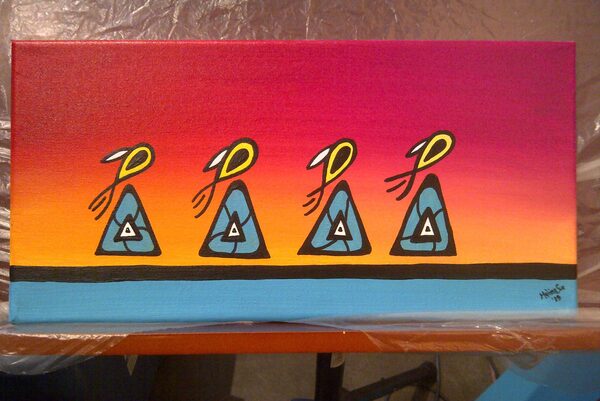
A painting by Mi'kmaq artist Melissa Labrador is seen in this undated handout photo. The organizers of the North American Indigenous Games in Halifax have admitted to making an error by failing recognize the artist's work in their logo for 2020 games.Melissa Labrador/The Canadian Press
Organizers of the 2020 North American Indigenous Games in Halifax have admitted they failed to acknowledge that the event’s logo — unveiled last week — was inspired by a Mi’kmaq artist in Nova Scotia.
The oversight involving Melissa Labrador happened amid the “excitement” of revealing the official brand for the event last Wednesday, the organizers said in a statement.
“The 2020 North American Indigenous Games Host Society would like to acknowledge that our logo was inspired by Mi’kmaq artist Melissa Sue Labrador,” the statement said.
“In our excitement to reveal our brand, we erred in recognizing Melissa and, going forward, we will continue to honour and respect the beautiful artistry of her work and the Mi’kmaq people which inspired the design of the logo.”
By Monday afternoon, the logo had been removed from the website for the 2020 North American Indigenous Games.
The logo features three stylized figures in a canoe with bright flashes of blue, red and yellow on their bodies and their paddles. Each of the figure’s has a head shaped like an inverted teardrop, a stylistic theme that runs through Labrador’s work.
Some of her artworks are inspired by the ancient Mi’kmaq rock etchings found in the Kejimkujik National Park and National Historic Site in western Nova Scotia, she said.
These petroglyphs, which are found along lake shores in the park, are closely connected to Labrador’s work — and her family — but the teardrop design marks the artist’s own interpretation of these revered carvings.
“My grandfather used to tell us stories of those who created them,” she said in an interview Monday.
Labrador said she began hearing from friends and colleagues soon after the logo was announced, most of them saying they were sure she had created it.
“I looked at it and said, ‘Wow, that does look like my art, but I did not do that,’ ” she said. “It’s clear that they were inspired by my art. I was flattered. But I was never contacted.”
She said she did not hear from anyone connected with the games until she reached out to the organization herself.
Labrador said organizers had pledged to issue a public apology on Monday morning, but that didn’t happen.
“There’s lots of opportunities for learning here,” said Labrador, who lives in the Wildcat community, which is part of the Acadia First Nation near South Brookfield, N.S.
“It’s not about money. I never asked for money. It’s more important that we learn about the authentic culture and promote that.”
Rod Jacobs, a spokesman for the games, said organizers were working on another statement for release on Monday afternoon.
The North American Indigenous Games are scheduled for July of next year in the Halifax area. More than 5,000 participants from across North America are expected to compete in 17 sports.